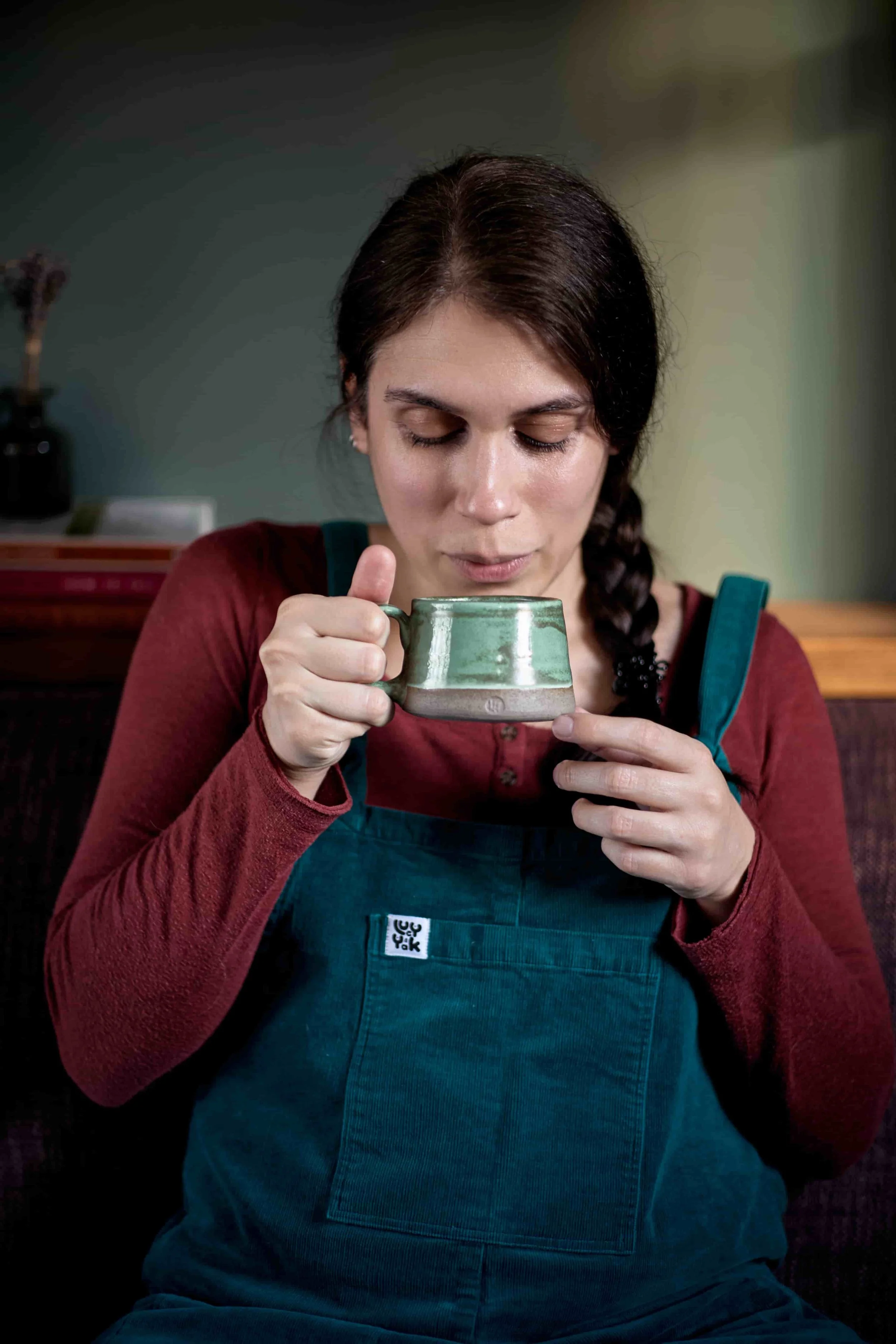
CBT for Overthinking is for those who…
Overthink everything and never feel quite enough
Fear failure above almost everything else
Live with high-functioning anxiety or OCD which is holding them back from being really, unapologetically themselves
Have tried CBT and it hasn’t worked - because my blend of CBT is actually more Acceptance and Commitment Therapy (ACT) and Mindfulness
An Overthinker’s Story…
You sort of fell into it all. Maybe as an alternative to being ‘the quiet one’, maybe to try and show you were good at something - because it wasn’t being fun or cool. Not because you’re not, but because what you found fun and cool was a bit different to what most people find fun and cool.
It started at school, or even earlier. Then carried on - good grades, good degrees, good jobs - or your own business, a lot of work. But it doesn’t quite click, it doesn’t feel like you.
If you took a silly internet quiz, your results may look like…
Overthinking, comparing, intrusive thoughts
Your brain won’t let you fall asleep as you replay all the things that went wrong in the past and might go wrong in the future, or get stuck in ‘what if’ loops or intrusive thoughts you can’t shake… all the while comparing (and despairing) when you see how well others seem to be doing (I promise, they’re not).
Feeling not good enough… or too much
No matter how well things are going, your brain focuses on the stuff that you should have done better. And when you get anxious, worry, or just try to… be yourself, sometimes it feels like you’re too much. You feel inadequate, like a failure.
Overplanning, procrastinating, checking, limiting yourself
You’re desperate to prove yourself - so you either overplan to make sure you’re prepared for everything, or procrastinate or avoid stuff because if you fail, you’ll be found out. Or maybe you check, recheck, and seek reassurance to feel certain. You also never really get to be yourself, because what if you let your guard down, and you’re rejected?
Overwhelm, shame, anxiety, guilt, exhaustion
When you constantly live to prove yourself, to meet others’ expectations, to make everyone happy, to fit into a mold… how else could you be feeling?
Stuck
Because you’re not living for yourself, and as yourself, not really - so you either don’t really know what makes you happy in the first place, or how to get there.
It might all link together…
Did you know that a fear of failure can often disguise itself as high-functioning anxiety or OCD?
Picture this: You grow up not quite fitting in for one or another reason, so being smart and achieving stuff (in any way, not just academically) becomes your thing. But you actually doubt yourself and your worth - so you do all you can to prove it.
You worry a lot, predict the worst, catastrophise, and get really anxious, because what if you get ‘found out’? - hello, ‘high-functioning’ anxiety (‘high-functioning’ because on the outside it seems you have it all together, but inside, you’re in overdrive).
You start trying to achieve complete certainty because to your high-achiever brain, uncertainty means you might fail. And failing means you're inadequate. So you end up spending hours checking, replaying conversations, seeking reassurance - not because you're ‘just’ anxious, but because it genuinely feels like you have to. Like you don't have a choice. Because otherwise, you ARE inadequate - hello, OCD.
See, it all links together. And the work we do together? It does too. I’ve called it CBT for Overthinking because I’ll wager that’s what your brain mostly does, but really, it’s CBT for OCD, for anxiety in all its forms, for low-self-esteem. For YOU. And the ACT and mindfulness bit - that’s the combo I’ve seen work best (and it’s what worked for me too!)
Here’s what you’re probably forgetting and ignoring
As an overthinker with what could be called high-functioning anxiety and/or OCD, you’re probably also quite good at:
Thinking outside the box
Seeing things for what they are
Zooming out and taking perspective
Analysing the hell out of things and thinking deeply about meanings
Spotting connections or patterns others miss
And so overthinking can also work to your advantage - once you learn how to work with it differently (which is what we'll do together in therapy).
Online CBT for Overthinking
… but make it holistic, affirming, and inclusive
Which means we’ll work with the anxiety, the overwhelm, the procrastination, the overthinking, the sticky, intrusive OCD thoughts - but not in a ‘plaster over a bullethole’ way.
We’ll do the in-the-moment stuff. But we’ll also go deeper, exploring both:
Beliefs (your fear of failure, vulnerability, proving yourself, doubting yourself, or being your true self and not being accepted)
Wider context (the systems, culture, dynamics, and trauma that shape the way you’ve learned to cope)
We’ll explore and get specific about how to shift things and move you forward in practical ways. We’ll challenge what’s unhelpful and honour everything you’ve been through and how your brain works. So you can stop feeling stuck and start making real progress.
And we’ll get you to a place where you feel more like yourself - your authentic, real, maybe a lil’ quirky self. Where you know you can handle what comes your way, live in alignment with what really matters to you, and experience the calm, peace, and contentedness that comes with that. So you can finally stop performing and start living.
More concretely: Evidence-based, skills-based therapy (Acceptance and Commitment Therapy / Cognitive Behavioural Therapy / Mindfulness). It’s CBT for overthinking, CBT for OCD, for anxiety, for low-self-esteem - for however your fear of failure shows up - but ACT and mindfulness breathe life into it.
We’ll spend time both exploring and using active interventions to help you unhook from the “I overthink everything” loop, so your true self has space to emerge and bloom. So you can trust yourself to handle life without overthinking every single decision.
Unpopular opinion: You don’t need to fix, change, or get rid of all that’s difficult
Being human is hard. Being an overthinker with high-functioning anxiety or OCD is harder.
Maybe you’ve read self-help books, tried affirmations, dopamine detoxes, “growth mindset” hacks. Maybe you’ve even been to therapy before - only to leave feeling like the unspoken message was that something about you needed to be fixed.
But what if it’s not about fixing (and maybe sometimes invalidating) your thoughts and feelings, like all these approaches have done? What if it’s about creating a different relationship to them altogether - one that honours your unique experiences, mind, and body, while moving you forward to where you want to be?
What if you learned to move forward with what really matters to you even when your mind is shouting 'but what if?' - because let's face it, it probably will be (mine definitely is). And that's okay. Because maybe the goal isn't to feel confident all the time, but to do what matters even when you don't.
That’s what I invite you to do with me.
So that you can…
Not get lost in overthinking or OCD intrusive thought loops
Feel your high-functioning anxiety without it limiting you
Find the sweet spot between procrastinating and overdoing things
Notice when checking and reassurance-seeking are OCD compulsions, and respond differently even when your brain demands certainty
Be present in your life and enjoy the little moments
Have more understanding and compassion for yourself
Know, deep down, that you are enough
This might look like…
A slow, quiet morning with no rush and no pressure - coffee or tea, maybe a book, or a walk to feel grounded
A weekend completely to yourself - sofa, tea, maybe a drink, books, movies, comfort shows, nostalgia, music - and knowing there’s nothing wrong with enjoying that
Relationships that feel natural rather than forced, and where you can show up as yourself and that be accepted - because you’ve learned to advocate for yourself
A “boring” life in the best way - slow mornings, cosy evenings, time with yourself or close people, space to savour what really matters
My Values & Approach
Here’s the thing: I’m a senior cognitive behavioural therapist in the NHS, a university supervisor, a mindfulness teacher, and I’ve worked in lots of different mental health services for many years, and also in academic research and healthtech. I also have 4 degrees (BSc Psychology, MSc Clinical Neuroscience, PGDip Psychological Intervention CBT, MSc Psychological Therapy).
But I think that all of that means squat if you don’t feel safe, heard, and understood by me. So, here’s what you can expect:
I use evidence-based, trauma-informed, affirming and inclusive approaches - CBT for OCD, overthinking, high-functioning anxiety; ACT, and mindfulness - no BS, airy-fairy stuff, and no cluelessness as to the systems, culture, dynamics, and trauma that shape the way humans operate
I have an understanding of good research - I’ll know when old approaches have been disproven, or when new exciting discoveries have been made
I have practised mindfulness personally since 2015, and have had my own therapy, mostly based on Acceptance and Commitment Therapy (ACT) - so I know what it’s like to be on both sides
Humanity (I’ll never pretend to have it all figured out)
Imperfection (because no one is, and those who try probably make terrible therapists)
Openness (about what’s working and what isn’t, about what’s really going on, about… everything)
Silly sense of humour (because sometimes that’s the only thing that makes sense)
Interested in working together? I’m so glad!
You deserve a life that feels like yours.
Having said that, I know reaching out can be a bit of a nerve-racking (and also amazing) step. So, because everyone’s different, here are your options to get started (and a more detailed overview below):
If you feel most comfortable starting in writing, contact me via this form
If you’d like to see if we click live, book a free 15-min consultation
If you’ve decided you want to go straight for an initial session to explore things in a bit more depth, book it below
Therapy sessions: £125/session
Book in week by week
How it all works…
(Optional): Reach out in writing OR have a free 15-minute intro call
Everyone’s different - some people prefer to get a feel in writing first, others want to see if they connect with someone live. Or you might even be ready to try a first session directly. Choose what feels right for you!
1
Initial session (up to 60 minutes), during which we’ll discuss:
Current difficulties, some background and history, & impact on your daily life
Goals & previous experiences of therapy (if any) - what was helpful and what wasn’t
How this all may link together & how ACT/CBT could help
What you need to make this work best for you
Your first between-sessions task
2
Ongoing sessions (45-50 minutes), during which we will:
Go deeper on our shared understanding of what may have led to development of your difficulties, and what may be keeping them going (called a ‘formulation’), to use as a basis for your treatment plan
Use a variety of interventions (ACT/CBT/mindfulness) to support you in achieving your goals
Set a plan / agenda at the start of each session to keep us on track (but this is not fixed and we can adapt according to your needs)
3
Ending therapy (which we both agree on):
We will discuss ending therapy a few sessions before the final one (and we will of course agree on this)
It’s natural to feel a little apprehensive about ending, so we really think together if it’s ‘just’ this, or if we’ve actually missed anything
During this final session, or perhaps last two sessions, we will work together to produce a summary of important points and a plan for the future
FAQs
-
It may be for you if:
You find yourself saying “I overthink everything”, worry all the time, have intrusive thoughts that won’t let you rest, you don’t feel good enough
You probably have “high-functioning” anxiety or OCD
You’re tired of brushing it off or trying everything under the sun without anything changing
You’ve tried other approaches and they’ve left you feeling invalidated, confused, or stuck
You want a therapist who, while always being on your side, will sometimes gently call you up on your BS to help you move forward
You want to live more authentically and are willing to put in some work for this to happen
(and also, you can reach out in writing or book a free 15-min intro call to ‘vibe’-check :-)
It may not be for you if:
You want an open, explorative space with no structure, practical skills, exercises, or things to do between sessions
You want to get rid of your difficult thoughts and feelings altogether and only experience positives
You want an uber-’professional’, blank-slate kind of therapist who will nod in agreement to everything you say and never challenge you
You want a quick fix or expect that things will change by you attending a session a week and continuing as you are outside of it
-
Short answer - almost. The only limitation is that I can’t offer therapy to clients based in the US or Canada due to licensing (and please note I work under UK jurisdiction, as I’m based and accredited in the UK).
-
I’m online-based only at the moment - so all sessions take place on Zoom. I love online therapy as research shows it’s just as effective as in-person therapy, but we can work together even if we live miles apart, and you get the comfort and flexibility that comes with it. As long as we both have good cameras and microphones, we can recreate most, if not all, of what we would do in a therapy room. You get high-quality therapy AND you can show up in a familiar, comfy space, with a hot drink.
-
ACT/CBT are goal-oriented and a therapy episode is usually completed in 3-6 months of weekly therapy sessions, but some people carry on for longer (we’re all different!)
The recommended frequency of therapy sessions is weekly - this is the ‘sweet spot’ frequency to allow for momentum to build but also allow for enough time for information to consolidate and skills to be practised between sessions
-
My speciality is working with adult (18+) high-achieving introverts whose fear of failure or rejection shows up as overthinking, ‘high-functioning’ anxiety, obsessive-compulsive disorder (OCD), and feeling not good enough, and keeps them from living as their real, authentic selves.
I also have a particular interest and knowledge in working with people who are neurodivergent or LGBTQIA+.
And I also specialise in working with dog phobia - see here.
Having said that, I am highly trained in working with a range of mental health difficulties, including stress, depression, generalised anxiety disorder, panic disorder, health anxiety, social anxiety, low self-esteem, perfectionism, phobias, and post-traumatic stress disorder (PTSD).
-
I generally do not work with people who present with severe and enduring mental health difficulties, including, for example, active symptoms of psychosis, or severe difficulties with emotional regulation - this is because such difficulties are best addressed in specialist services which consist of multi-disciplinary teams of clinicians.
Importantly and relatedly, I also do not work with people who are presenting with concerns related to their own safety or that of others - as in private practice I do not have access to professionals and facilities which would support managing such concerns, and therefore, it would be unsafe and unprofessional.
-
I am not set up to provide crisis support, so I am not able to respond to any urgent queries between sessions, nor am I able to work with people who have concerns about their own safety or that of others.
If you are having such difficulties and are in the UK, please call 999 or go to A&E. You can also contact your GP or local NHS mental health service for urgent support, contact the Samaritans on 116 123, text Shout to 85258, or use the Stay Alive mobile app.
If you are outside of the UK, please contact your local emergency services.
-
I have quite a few, bit of a nerd here :-) The most relevant ones are my PgDip in Psychological Intervention (CBT) from the University of Surrey, which I then topped up with an MSc in Psychological Therapies from the University of Exeter, and my accreditation with the BABCP (British Association for Behavioural and Cognitive Psychotherapies) as both therapist and supervisor. I also completed the Mindfulness Teacher Training Pathway with The Mindfulness Network/University of Bangor.
But I also hold a BSc (Hons) in Psychology from the University of York, an MSc in Clinical Neuroscience from UCL, and plenty of experience - read more about me here
-
The type of therapy I offer is evidence-based and structured, goals-oriented, and forward-focused.
We’ll do the in-the-moment stuff. But we’ll also go deeper, exploring both:
Beliefs (your fear of failure, vulnerability, proving yourself, or being your true self and not being accepted)
Wider context (the systems, culture, dynamics, and trauma that shape the way you’ve learned to cope)
We’ll spend time both exploring and using active interventions to help you unhook from the “I overthink everything” loop, so your true self has space to emerge and bloom.
Read more about ACT here.
-
You’re definitely not alone! Talking to a complete stranger about your deepest thoughts and feelings can feel quite daunting when you think about it, and I really get that - and many clients tell me the same thing.
That’s why I offer a few options so you feel as comfortable as possible:
-
That’s a big question with a lot of nuance, but it may boil down to two main aspects:
What you physically do: Regular attendance and real active engagement in the sessions and with between-sessions tasks, including making notes, keeping diaries etc. - simply attending sessions is unfortunately unlikely to lead to effective, long-lasting change
How you think about it: It’s ok to be sceptical, it’s ok to not ‘think positively’, it’s ok to not feel like attending, and it’s ok to not leave every session feeling like you’re on cloud nine.
What’s going to get in the way though is you not sharing all this stuff with me. I not only will not take offense at you sharing it, but very much encourage you to - to make sure you make the most of our sessions, and to give us a chance to work through these challenges, which are a common part of the process.
Although I’ll check in, at the risk of pointing out the obvious, while I understand that sharing is difficult, and I will of course be sensitive about this, I cannot help you with issues you do not share with me - and these may impact on our work and ultimately on what you get out of the therapy process.
-
Therapeutic work can inherently feel challenging due to increased awareness or reduced avoidance of internal and external experiences - but it should never feel unmanageable. I will always ensure any work we engage in is collaboratively decided, with your informed consent. You do not have to, and should not, engage in any work without understanding the rationale behind it and feeling confident that it was ultimately your choice. We can always discuss, review, reiterate, and break things down such that you feel confident in the work we are doing together.
If I feel at any point that my approach is not the most suited to you, I will of course discuss this with you and we will agree on next steps, such as referrals and sign-posting.
-
Another big question with a lot of nuance! Without being waffly, it really depends on what you mean by ‘healing’, what your expectations are, and what timeline you have in mind. I’m not going to say it’s impossible because in some cases time or changing unhelpful or even toxic circumstances can absolutely heal. Some people also get lucky and come across the right set of resources and do some work themselves. Some people don’t find certain types of therapy helpful. But if you relate to what you see on this website, if you give it a real chance, it could get you closer to where you want to get, more quickly. The rest is up to you!
-
Not at the moment, no. It means fewer limitations around logistics (like number of sessions) for you, too!
… and breathe. You may just have found a way to go from being terrified of being found out as a failure (and the anxiety, overwhelm, and discontent that goes with it) to a life that not only feels more authentic but also celebrates your beautifully unique experiences and mind.
I’m here when you’re ready.






